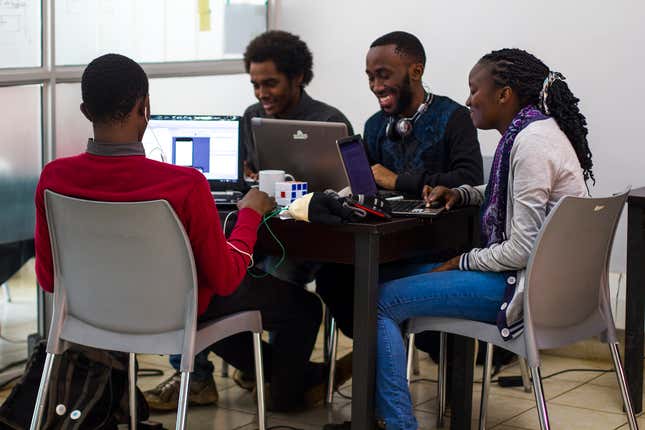An African startup is out to help thousands of young people in Pakistan’s northwest learn how to code.
The Moringa School, a Kenya-based for-profit for digital skills training, is rolling out a 20-week full-stack software development course in Khyber Pakhtunkhwa, a restive Pakistani province bordering Afghanistan. The project is part of the government-led Khyber Pakhtunkhwa Youth Employment Programme, which aims to train 30,000 young people. Relaunched in October this year, the scheme taught basic digital skills to 4,000 people in its first phase in March 2016.
“We want to be able to create at least 50% of jobs in the province through the tech industry,” Asim Ishaq, deputy director of projects at the Khyber Pakhtunkhwa Information Technology Board (KPITB), told Quartz.
Khyber Pakhtunkhwa is demographically the youngest of all provinces in Pakistan, with 73.8% of its population aged below 29. With the increasing adoption of smartphones, more companies turning to big data, and a budding startup ecosystem, digital skills are coveted in the region. And if the right talent is honed, the region could become an outsourcing hub, according to Ishaq.
Founded in Nairobi in 2014, Moringa has been training African youth in computer skills ranging from the basics of programming to advanced courses such as full-stack Django, a high-level Python framework. So far this year, it has trained over 350 students—in Kenya and via partner institutes in Hong Kong and Ghana. In its hometown, it boasts of a job placement rate of 95%.
Typically, students have to pay upto $1,500 for Moringa courses, but in Pakistan, the government and the World Bank will bear all costs.
But competition will be tough, considering that Moringa’s programme will initially launch in only two or three cities in Khyber Pakhtunkhwa, with 40 seats each. More than 550 applications have already come in. Candidates are rejected if they show “attitude problems or real personality problems,” Audrey Cheng, who created the institute while remotely assisting a Nairobi-based seed capital fund, Savannah Fund, told Quartz. “We want to be viewed as a serious institution.”
Job-ready

Training at Moringa runs from around 9am to 5pm on weekdays, where a typical day begins with guidance from ”tech mentors”—trained software programming professionals. Then, students spend most of the day building projects and their portfolio, instead of being lectured at.
“It’s a very hands-off approach. We want students to take ownership of their education,” said Cheng, who was a student at Northwestern University in the US when she launched Moringa.
In Pakistan, the coding school will share its curriculum and teaching plans and also help select and interview the candidates. However, the mentors will be local and their salaries will be paid by the state.
Since “the level of expertise here in Pakistan is at a very preliminary stage,” Ishaq said, Moringa will do some hand-holding. For instance, instructors from Pakistan will travel to the Moringa’s existing locations for training.
If the model works and the local faculty can deliver the goods, the government plans to scale the project up, covering more remote areas in all 26 districts of Khyber Pakhtunkhwa.
